Musicarta Beat and Rhythm Workbook
Syncopation and Anticipation
Module Two
You need to have completed Module 1 of this series and to be able to play the final practice pattern from it (repeated below) well before continuing.
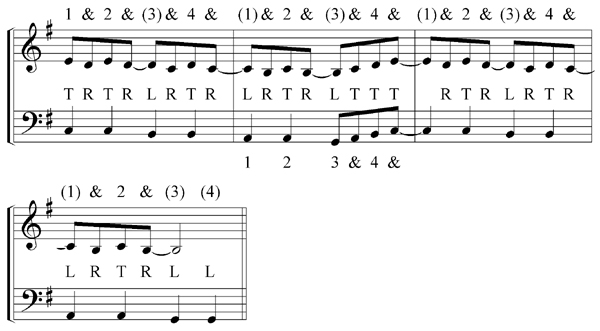
This second Anticipation and Syncopation module is going to offer some fairly standard variations on the material in Module One. Please note that if the music sounds a little dated, the rhythmic skills involved will never go out of fashion! It makes good sense to practice difficult skills on simple material.
There is a MidiPiano video performance of all the practice patterns in this module at the end of the web page. Please work through all the patterns individually before using the video for revision purposes.
Practice Pattern 10
This variation uses note G as the in-between note in the right hand, and sticks to the straight four beats in the left (bar 2, joining the two halves).
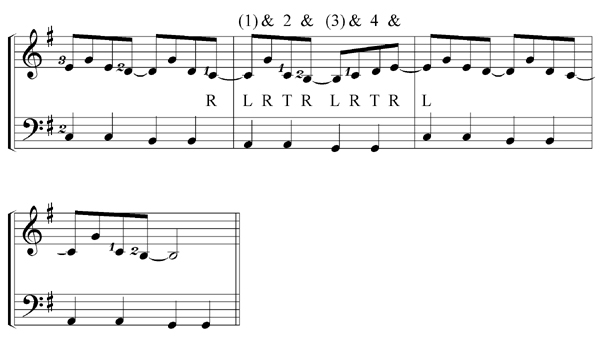
The changes mean we need to consider the fingering and take note of the changed TLR in the second bar.
Practice Pattern 11
Of course, the G below will do just as well.
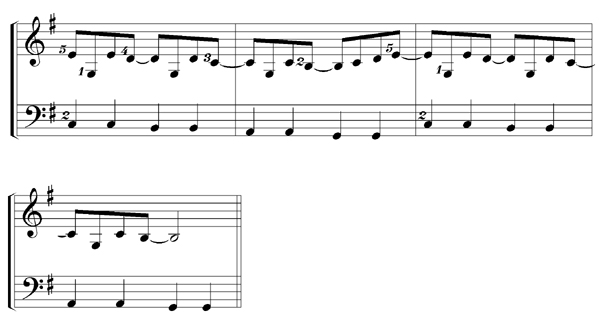
The counting and TLR is just the same, but the fingering has to be re-thought.
Practice Pattern 12
If you get the fingering sorted out, you can alternate top and bottom Gs, and mix and match with next-door in-between notes.
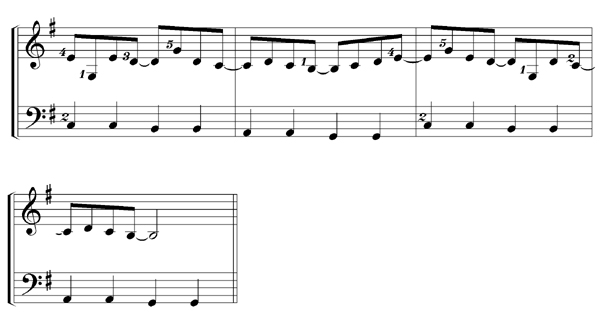
Choose your favourite combination! All the Musicarta Beat and Rhythm material can be re-combined to generate endless riffs - once your fingers can do the tricks.
Practice Pattern 13
Now let’s go back to Practice Pattern 10, and start making the top G ‘sticky’
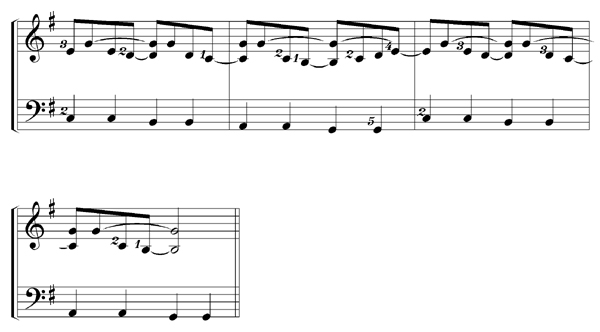
The music isn’t quite correctly written – advanced beat and rhythm look very intimidating when written properly – but you see that, once a top G is played, you hold it down as long as you can. 'Sticky’ describes very well both the sound – listen to the audio clip carefully – and the feeling of playing it.
Practice Pattern 14
Now start adding lower G's to the beat 1 and 3 right hand notes – whether they are on the beat or anticipated.
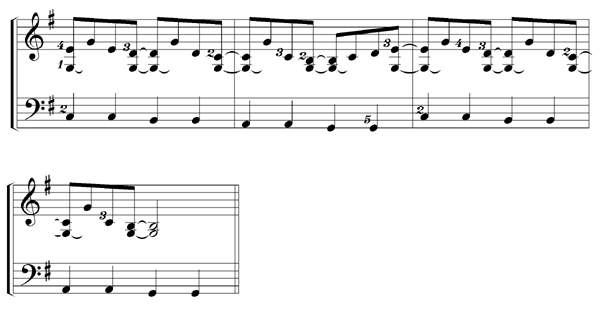
The lower G’s are ‘sticky’, like before. The sticky G’s are indicated by ‘ties-to-nowhere’. Listen to the sound clip carefully for the sticky lower G and make sure your RH thumb stays down as much as possible.
Practice Pattern 15
The next example takes syncopation to the extreme.
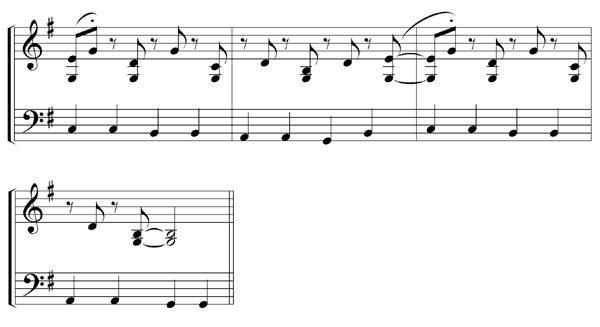
Here's what you should do when you see beat and rhythm getting complicated like this:
- Stop trying to play it by trial and error.
- Do the counting.
- Do the TLR analysis.
- Tap it out.
- Add the notes back in.
Here’s the pattern with the counting and TLR done.
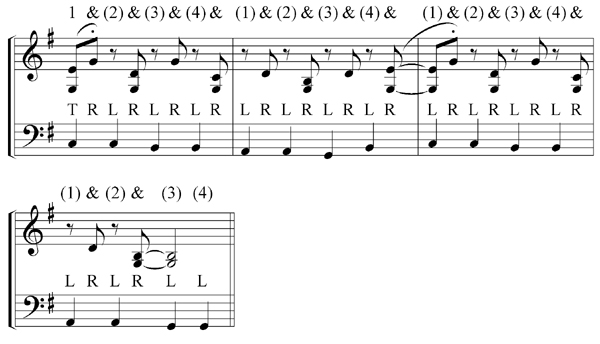
Notice that there’s only one main (number) beat where the right hand plays, so there’s only one ‘together’ (T) – and that’s the first note in the segment.
Here’s the beat map of the segment.
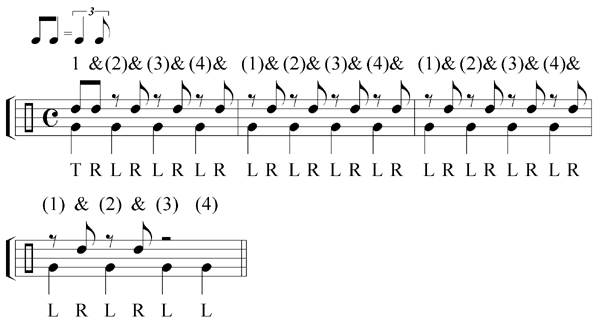
Notice the reminder to stay in swing quaver rhythm.
Once you can keep the desktop drumming going to the end with the left hand on the count (tap your left foot and/or count out loud if you can), put the notes in. Here’s what you should hear.
Practice Pattern 16
Now we will change the left hand rhythm – it joins in with what the right hand is doing. This segment is only a preparation study
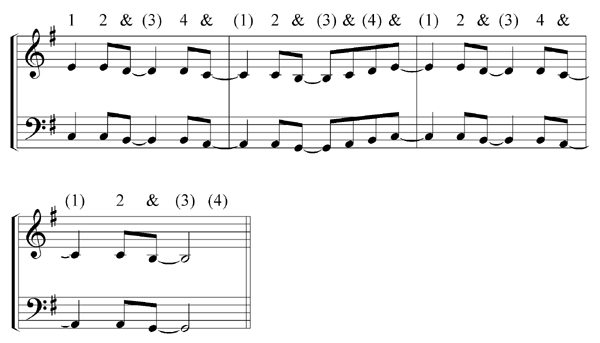
Straight away, add the upper G’s from Practice Segment 10.
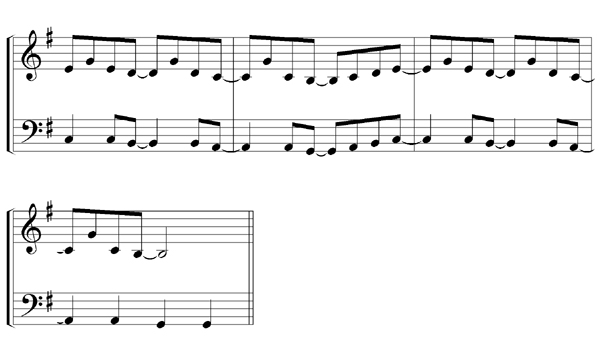
Notice how the left hand drops the anticipation in the last bar. When you’re pulling lots of beats forward (anticipating), you have to take care to re-establish the main beat at some point – and the start/end/repeat is the obvious place. Otherwise, your listeners can easily get lost and find your music confusing to listen to.
Practice Pattern 17
Change the left hand rhythm again. Drop the anticipation and play the t left hand notes (two of each) on 1, & 3. & 1. & 3, under the right hand of the previous segment.
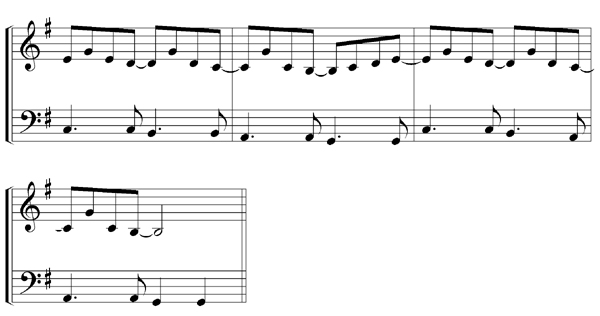
Hopefully, before you try playing, your mind and eyes do a quick together-left-right scan and come up with this.
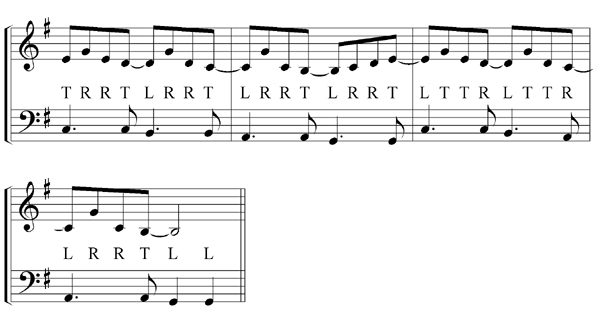
You notice that the first bar is different, but all the rest are essentially T L R R T L R R, so you practice tapping:

Module performance
Here is a MidiPiano performance video of Practice Patterns 10 through 17. Use it to check your performance and reading.
Practice Segment 18: Riff
Here’s a piano riff built on the finger patterning you have learnt in this lesson.
It’s based on this harmonic material.
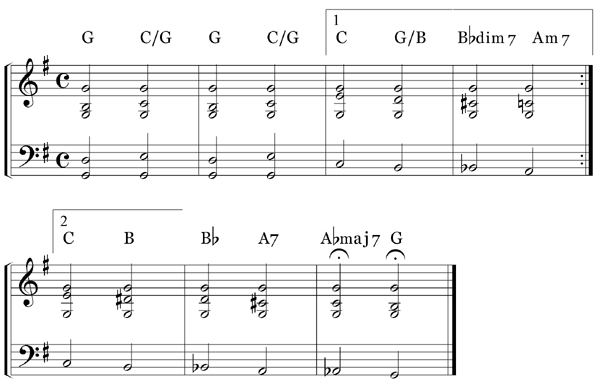
The riff doesn’t follow any pattern completely faithfully, but you should be able to get it - or a good-enough-for-now approximation (a 'stepping stone performance').
This is the end of the Syncopation and Anticipation modules in the Musicarta Beat and Rhythm series. Click up to the Beat and Rhythm series home page here to see what else in available to help you add winning rhythms to all your keyboard material.
|
OUT NOW! |
THE MUSICARTA BEAT & RHYTHM WORKBOOK At last! An effective approach to keyboard rhythm & syncopation skills. Learn more! |
ONLY $24.95! |
The MusicartaA methodical approach to keyboard syncopation for
|
PUBLICATIONS
exciting keyboard
creativity courses
CHORDS 101
WORKBOOK

~HANON~
video course

Musicarta
Patreon
PENTATONICS
WORKBOOK
video course

Creative Keyboard
video course

BEAT AND RHYTHM
WORKBOOK
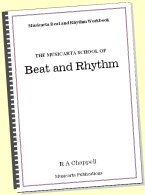
- Volume 1 -

12-BAR PIANO
STYLES WORKBOOK
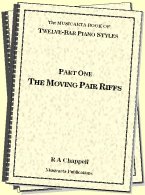
MUSICARTA MODES
WORKBOOK
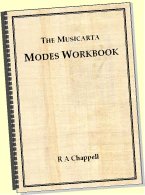
PIANO STYLE
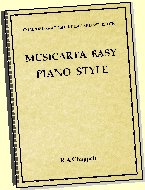
CANON PROJECT
video course
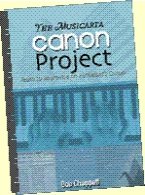
VARIATIONS
video course
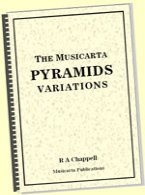
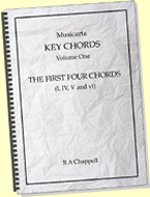
- Piano Solo -
video course
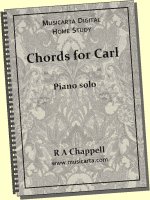
- Piano Solo -


YouTube playlists





 THE LOGO
THE LOGO
